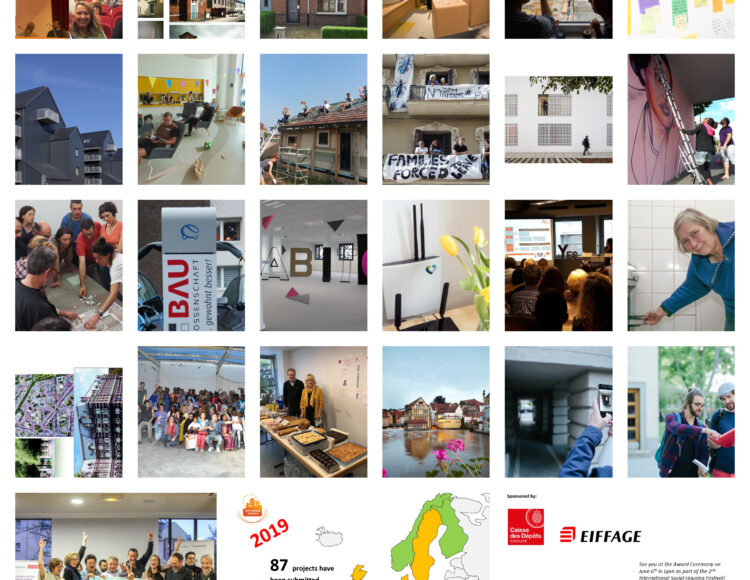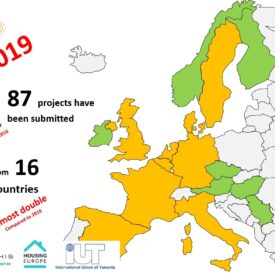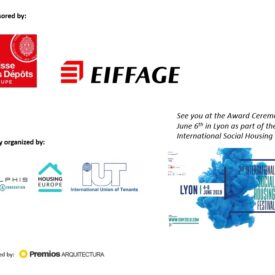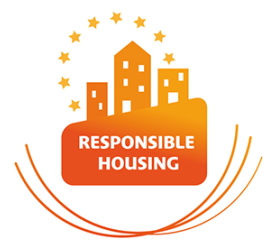This year for the 3rd edition of the European Responsible Housing Awards, we received a record-breaking number of 87 submissions (an increase of 29% compared to 2016) across five categories from 16 countries (almost double compared to 2016), and so, deciding on five winners and finalists was no easy task for the Jury. However, decision-day has come and gone, and we are delighted to announce the finalists of this year’s European Responsible Housing Awards and we invite you to meet them virtually below and on the 6th of June in Lyon at the International Social Housing Festival.
Fair financing for housing affordability
- From Streets to Homes – HOUSING NOW! – Budapest, Hungary
In the context of a housing crisis and where little to no social housing exists, organisation UT Utcáról Lakásba Egyesület decided to take matters into their own hands and acquire properties themselves, using Housing First and Tiny Homes approaches, and making agreements with municipalities.
- Ekedal – Skövde, Sweden
Public housing company AB Skövdebostäder built 150 energy-efficient apartment, made affordable especially for young people. This project was nationally recognised and is now regarded as best practice.
- Permanently affordable and anti-speculative housing development in the City and the Metropolis of Lille – Lille Cedex, France
Non-profit Association Organsime de Foncier Solidaire de la Métropole Lilloise set out to acquire and manage land (built-up or otherwise) in order to neutralise land cost over time, so as to decreasing housing construction cost and increase housing affordability.
- Handy Houses – Antwerp, Belgium
The cooperative company De Ideale Woning sells Handy Houses at affordable prices – vacant, out-dated social housing, which can be purchased in two payments: at half the value of the land in one lump-sum, and the other half over 70 years. There is a requirement for renovation and De Ideale Woning will support and supervise these works.
- Place-based anti-speculation housing policies – Barcelona, Spain
Public company Institut Municipal de l’Habitage i Rehabilitacio (IMHAB), as part of the forward-looking Right to Housing Plan 2016-2025, pursued “place-based anti-speculation housing policies” – which included, among other things, selective acquisition of privately-owned housing units, mobilisation of affordable housing through bilateral agreements with private landlords.
More than a roof
- Nettelbeckplatz – An experimental way of renewal a cooperative housing estate in Berlin – Berlin, Germany
Housing Cooperative Berliner Bau- und Wohnungsgenossenschaft von 1892 eG pursued an experimental and innovative renewal of a 1970s social housing complex (from 1970s), which featured adaptations as well as additions/extensions (of modern apartments, ateliers, co-housing solutions for a variety of households), using innovative construction strategies, energy-saving technologies, improving accessibility, expanding common spaces, and supporting the self-organised community.
- Preventing evictions through intervention of social workers – Vienna, Austria
In their aim to provide affordable and adequate accommodation, municipal housing company Wiener Wohnen adapted their approach to include Case Management, with the specific objective of preventing eviction through intervention of social workers.
- La Borda – Barcelona, Spain
Non-profit Cooperative Habitages La Borda SCCL spent 6 years pursuing a bottom-up organisational scheme in order to create a 28-unit housing cooperative, with low environmental impact and high community spirit. From day one, the residents initiated the design, funding, legal and economic decisions, conviviality schemes, with the help of social networks, surrounding neighbourhood and external expertise.
- The Block – Helsinki, Finland
Social enterprise Setlementtiasunnot promotes multi-generational block living, an innovative, user-centred and holistic social housing approach, exemplified in their project “The Block”. 262 apartments apartments for students, families, older people, and 20 wheelchair users.
- Building a new housing organisation with the community, building community within a new housing organisation – Saint-Gilles, Belgium
Non-profit organisation Community Land Trust-Brussels develops permanently affordable owner-occupied housing on community-controlled land. Using funds from Brussels Capital Region, houses are developed for people on low-income and the land remains property of CLTB community. 10 homes are inhabited, 40 homes are close to move-in day, with 100 more in preparation.
Leaders of innovation, agents of fair energy transition
- Housing for senior citizens in Barcelona (L) – Barcelona, Spain
Private company Ravetllat arquitectura aimed to build public rental housing for older people, with services adapted to their needs regarding mobility and accessibility. The project features passive energy control measures to facilitate use and maintenance with minimal ecological impact, and promotes common areas as spaces of relationship.
- Germany’s first energy-autonomous apartment building – Wilhelmshaven, Germany
Cooperative company Wilhelmshavener Spar- und Baugesellschaft eG have constructed Germany’s first energy-autonomous apartment building, using innovative building technology, and enabling residents to obtain two thirds of their heat and electricity from their own resources at a flat-rate with transparency and cost-security.
- Rapid Delivery Housing at George’s Place – Dún Laoghaire, Co Dublin, Ireland
The local authority Dún Laoghaire Rathdown County Council project provided 12 high quality energy-efficient A1-rated dwellings, using rapid-build, modular construction and high density approaches, which maximised the value of serviced brownfield land, in order to provide family housing with own door access.
- A neighbourhood running on water – Energy-efficiency in the middle of the world heritage – Bamberg, Germany
The foundation Joseph-Stiftung, kirchliches Wohnungsunternehmen has managed the historic “Upper Mills” neighbourhood, which features a student residence, hotel, restaurant and an under-water hydro-powerplant, since the 1970s. Today, the power-plant is completely emission-free, energy-savings projects have been initiated and the entire neighbourhood is completed powered by green energy.
- Moerwijkzicht Breda – Roosendaal, Netherlands
Non-profit organisation Alwel – wanted to make “future-proof” their housing complex and so initiated a major energy renovation of 241 social rental homes. This involved numerous actions, including complete disconnected from gas connect, improved insulation and ventilation, increased comfort, decreased consumption, upgrades in lighting and window, new overall aesthetic following a design and colour scheme. However, it was the resident involvement and intensive collaboration (diverse mix, ca. 25 different nationalities, and 25 residents designed “floor contact person”) which was the project’s “most significant success factor”.
Building strategic alliances, fostering community participation
- “Gemeinsam sicher Wohnen” – Living Safely Together – Vienna, Austria
Municipal housing company Wiener Wohnen launched this project, a collaboration between tenants, housing provider and local police, to increase levels of safety and security in the neighbourhood. This involved tenants identifying areas where they feel unsafe, recommendations from crime prevention experts and Wiener Wohnen acting on these during renovation projects.
- Let’s talk about housing! – Vitoria-Gasteiz, Spain
Basque Housing Observatory as part of the Department of Environment, Territorial Planning and Housing, along with 30 other organisation, collaborated on the co-design of public policies, including the guidance plan for housing. In parallel, a new citizen participation and communication platform “Etxebizitza” was formed. These tools have been developed to identify the needs and concerns of people.
- Huis Assendorp: full of life – Utrecht, Netherlands
Housing corporation Habion’s wished to transform a retirement home into into a housing complex which could meet the requirement’s of today’s senior citizens, as well as tomorrow’s. Before the project, Habion asked the community “how do you want to grow old in this neighbourhood?” and collected over 1,000 wishes. This acted as guidance and, over-time, the project attracted students, young people, and local businesses.
- The Kaleidoscope Project – Villeneuve-Saint-Georges, France
Public housing company Villeneuve-Saint-Georges OPH acknowledged structural challenges in the area and vulnerable residents in the community. They also recognised the need to evolve their decision-making processes, by involving tenants more fully, in fact, by pursuing a “100% participation” policy. Practically this mean prioritisation of projects, exchange of ideas, conversational walks, participatory work-camp, amongst other actions.
- Pflege@Quartier – guaranteed care in the neighbourhood – Berlin, Germany
Housing company GESOBAU AG’s initiative had the aim of helping senior citizens maintain an independent life in their own homes and it achieved this through the provision of personal services, neighbourhood management, technical technical assistance systems and structural engineering measures.
Empowering the team, addressing employees changing needs
- 24 hours of managerial innovation – Rouen Cedex, France
Housing company Habitat 76 organised a 24 hour “hackathon” (space for innovation, co-creation and learning) in which ten teams had to resolve four specific challenges. The aim was to create innovating managerial methods, making human interactions a priority. The two winning projects answered the questions, “Participatory governance – how to associate employees in the firm’s decision-making” and “How can we take advantage of digital development and use it to improve daily life?”
- Gewobag City Campus – an employee development programme – Berlin, Germany
The public limited company Gewobag Wohnungsbau-Aktiengesellschaft Berlin created the City Campus – a comprehensive learning and innovation programme for the development of the company. Here, employees in all capacities can drop in for consultations, where topics are identified, and working groups are formulated.
- Power to the People – empowering the team to improve services – Torino, Italy
Public body ATC del Piemonte Centrale underwent a strategic repositioning of the organisation, which involved comprehensive training of 100 staff members, as well as redefining dialogue with stakeholders, implementing new procedural and managerial methods, and service-oriented approaches.
- Working for the common good – “1,100 Stunden sozial engagiert” (“1,100 hours of voluntary work”) – Berlin, Germany
Housing company Gesobau AG created a volunteering database, including concrete fields of action and specific tasks, in collaboration with cooperation partners, volunteer agencies, network partners, daycare centres, schools, neighbourhood centres, etc. So far, 300 employees have been involved in 94 activities at 53 different institutions and initiatives.
- Reinventing Management: from a traditional organisation to a horizontal company releasing creativity – Villeurbanne, France
Public company Est Métropole Habitat wished to move towards a new approach to management which would promote “creativity, autonomy, accountability and co-production”. Five working groups were created: 1. Strengthen the knowledge, 2. Encourage usability, 3. Develop the practice of feedback, 4. Increase the number of initiatives taken by those closest to the field, 5. Reduce frustrations, of which 10,000 ideas emerged, culminating in “colour-based management”.
You can read up on all 25 winners and finalists, who will be featured in the ERHIN Awards handbook to be published next month.
Join us and come meet the winners at the ceremony on June 6th at the 2nd International Social Housing Festival in Lyon!
If you have any questions regarding the Awards, please contact us.



